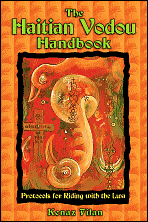
Vodou is a religion that I’ve been interested in for several years, but never quite sure how to approach. I always wanted to give it more respect than the paradigmal piracy of Hyatt and Black’s Urban Voodoo, which is well-written, but as is the downside of paradigmal piracy, not always as respectful of the paradigm being borrowed from. While that works for some people, it’s something that personally I’m not comfortable with. On the other hand, not being in contact with any practitioners of Vodou, I wasn’t really sure where to begin as far as solitary practice went.
This book has some answers for my dilemma. It’s basically an introduction (and a very thorough one at that!) to Vodou that will make sense to neopagans (such as your dear and beloved reviewer). However, it is NOT “Vodou Wicca” or some crap like that. The traditions themselves are not mixed with neopaganism (e.g., drawing down Ezili Freda under the full moon), though Filan does make mention of recent neopagan integration of the service of certain lwa into personal practices. Rather, it’s the religion of Vodou explained in a way that it answers some of the misconceptions that are common in neopaganism.
Of course, the audience isn’t restricted to neopagans. This is an excellent introductory text for folks of any background. Filan covers a lot of ground in not quite 300 pages–the history of the culture that gave birth to Vodou, as well as origins of various elements of it; detailed chapters on individual lwa; and an explanation of some of the more common rituals and magics practiced. The back of the book has pages of useful resources, whether you’re content being solitary or would like to get in touch with a reputable house.
I definitely have to commend the citational endnotes. Too many authors don’t give credit where it’s due, but Filan shows his work nicely. His writing style is easy to read with a light dash of humor (especially when describing the antic of the Ghede!). However, he’s not afraid to tackle controversial subjects, such as racism, and problems that non-Haitians may face when exploring Vodou (and how those problems got to be there).
This isn’t a candy-coated (or, for that matter, ooga-booga scary) look at Vodou. It’s honest and respectful, and has a good balance of information and respecting oathbound material. If you’ve any interest in this religion whatsoever, even just curiosity, this is a great place to start.
Five pawprints out of five.
~review by Lupa
Author: Kenaz Filan
Destiny Books, 2007
283 pages
